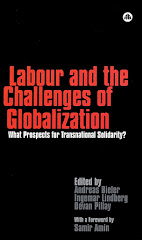The global financial
crisis shook the global economy in 2007/2008 and its fallout can still be felt
in the form of high unemployment, permanent austerity and wage stagnation. In
the immediate aftermath, many started to question the neo-liberal assumptions
about the benefits of the ‘free market’. Had it not been the deregulation of
financial markets and here in particular the financial markets in the US, which
had caused the crisis in the first place? And yet, almost ten years later, neo-liberal
economics continues to reign supreme. In this blog post, I will assess the
strange non-death of neo-liberal economics and its implications for the
politics of the British Labour Party under Jeremy Corbyn and John McDonnell.
The failure of neo-liberal economics?
Neo-liberal economics
has clearly failed as the example of Greece demonstrates. Despite the
imposition of one austerity programme after another including the privatisation
of national assets, deregulation of the labour market and public sector cuts,
the country remains in dire economic difficulties. Unemployment has reached
23.5 per cent with youth unemployment above 50 per cent and 37 per cent of the
Greek people are estimated in risk of poverty and social exclusion, being
unable to make ends meet (The
Observer, 8 April 2017).
Countries outside the Eurozone crisis have not fared much better. In the UK, despite austerity policies since 2010, the national debt has increased from £1 trillion in 2011 to £1.7 trillion in March 2017 and is estimated to reach 1.83 trillion in March 2018 (UK Public Spending). The Conservative government, constantly reminding austerity weary citizens that bringing down the national debt is the most important objective, could not fail more clearly. At the same time child poverty is at the highest level since 2010 (The Guardian, 16 March 2017) and the usage of food banks stands at record levels (The Independent, 26 April 2017). Again, how is this continuing focus on neo-liberal economics possible considering its so obvious failure?
Nevertheless, what if it is not a failure after all? Of course, in terms of inequality in society, rising social deprivation and mounting national debt, in other words in terms of the general national economy and a distribution of wealth along principles of social justice, it is a failure. But perhaps neo-liberal economics has never been about a successful and fair national economy? I argue that we need to understand the class interests underpinning neo-liberal economics, if we want to understand its non-death.
Social democracy in the 21st century: redistribution in good times.
In the 2000s, Social Democratic, Labour Parties were in power in a number of countries around the world. The examples of the Brazilian experience under Presidents Lula and Rousseff as well as the UK under New Labour will provide some indication about Social Democracy’s success, but also limits. Against the background of a boom in export commodities, Brazil under the workers’ party made enormous efforts at limiting increasing inequality and moving people out of poverty. The Presidencies of Lula and Rousseff are marked by an increase in minimum wages and pensions, the introduction of the so-called Bolsa Família programme for 12 million families as well as significant levels of state investment in infrastructure projects. As a result about 20 million Brazilians have escaped poverty (The Economist, 30 September 2010).
Countries outside the Eurozone crisis have not fared much better. In the UK, despite austerity policies since 2010, the national debt has increased from £1 trillion in 2011 to £1.7 trillion in March 2017 and is estimated to reach 1.83 trillion in March 2018 (UK Public Spending). The Conservative government, constantly reminding austerity weary citizens that bringing down the national debt is the most important objective, could not fail more clearly. At the same time child poverty is at the highest level since 2010 (The Guardian, 16 March 2017) and the usage of food banks stands at record levels (The Independent, 26 April 2017). Again, how is this continuing focus on neo-liberal economics possible considering its so obvious failure?
 |
| Photo by Walt Jabsco |
Nevertheless, what if it is not a failure after all? Of course, in terms of inequality in society, rising social deprivation and mounting national debt, in other words in terms of the general national economy and a distribution of wealth along principles of social justice, it is a failure. But perhaps neo-liberal economics has never been about a successful and fair national economy? I argue that we need to understand the class interests underpinning neo-liberal economics, if we want to understand its non-death.
Against the background
of the global economic crisis, there are enormous amounts of private capital
sloshing around in the system in a desperate search for profitable investment
opportunities. Some estimate that this private finance amounted to $1.73
trillion in 2015 alone. Understood from the perspective of capital, austerity
in countries such as Greece and the UK has not been a failure. On the contrary,
it has allowed capital to open up the public sector for private investment. Be
it airports or the port of Piraeus in Greece, be it parts of the National
Health Service in the UK, capital has used the economic crisis in order to
force countries to privatise national assets. Neo-liberalism has not been a
failure for capital, securing super profits in times of economic crisis. It should
be no surprise that in these circumstances capital and its bourgeois parties in
power are reluctant, if not unwilling, to move beyond neo-liberal economics. But
what about the centre-left, what about Social Democracy?
Social democracy in the 21st century: redistribution in good times.
In the 2000s, Social Democratic, Labour Parties were in power in a number of countries around the world. The examples of the Brazilian experience under Presidents Lula and Rousseff as well as the UK under New Labour will provide some indication about Social Democracy’s success, but also limits. Against the background of a boom in export commodities, Brazil under the workers’ party made enormous efforts at limiting increasing inequality and moving people out of poverty. The Presidencies of Lula and Rousseff are marked by an increase in minimum wages and pensions, the introduction of the so-called Bolsa Família programme for 12 million families as well as significant levels of state investment in infrastructure projects. As a result about 20 million Brazilians have escaped poverty (The Economist, 30 September 2010).
In the UK too, the New
Labour governments of Tony Blair and Gordon Brown between 1997 and 2010 made a
positive impact on poverty. They introduced the minimum wage, set up Sure Start
programmes to help young children from disadvantaged backgrounds and
significantly increased investment in health and education. In short, both
Brazil and the UK are two examples of a major redistribution of income.
Nevertheless, this income redistribution occurred in times of economic booms. More
money was distributed to the less well off, but capital and its dominance over
the economy was not challenged. As Peter Mandelson, one of New Labour’s key
architects stated early on, ‘I am intensely relaxed about people becoming filthy
rich, as long as they pay their taxes’ (Peter Mandelson, 1998).
Unsurprisingly, when
economic recession hit, these social democratic gains were quickly denounced by
capital and subsequently cut back. In the UK, New Labour was replaced by a
coalition government of Conservatives and Liberals in 2010 ushering into a
period of severe austerity policies. In Brazil, the centre-right removed
Rousseff from power in 2016 in circumstances resembling a coup (BBC, 22 March
2016). Clearly, the redistribution of income
without attacking capital’s role in the economy had not paid off.
Challenging Capitalism: working towards a new economics.
The lessons from these
social democratic experiences are clear. There is a need of direct
confrontation with the interests of capital. It is not enough to focus on
redistribution without challenging the position of capital in society and the
economy. It is in this respect, that the current Labour Party leadership in the
UK around Jeremy Corbyn and John McDonnell are promising a change in direction.
This is most clearly expressed to date in the Labour Party Manifesto of June 2017. Note the following statements:
‘We will take on the
social scourge of tax avoidance through our Tax Transparency and Enforcement
Programme’ (P.9). Here, the Labour Party makes clear that it will counter
capital’s focus on super profits through tax avoidance.
‘Labour will … bring
key utilities back into public ownership’ (P.19). Capital’s interest in profitable
investment opportunities through the privatisation of public assets will be
curtailed.
‘Labour will
reintroduce maintenance grants for university students, and we will abolish university
tuition fees’ (P.43). Labour will, thus, put a stop to the marketization of
Higher Education and make it again a public good, not an individual, private
investment opportunity.
Moreover, Labour will
directly attack capital’s power in the workplace by banning zero hour contracts
and empower trade unions through the repeal of the Trade Union Act and a roll
out sectoral collective bargaining. Additionally, it will raise the minimum
wage to £10 an hour by 2020 (P.47).
‘The next Labour
government will reverse privatisation of our NHS and return our health service
into expert public control’ (P.69). Again, capital’s interest in profitable
investment opportunities will be confronted head-on.
The direct confrontation with capital was also confirmed by Jeremy Corbyn when he told 'Morgan Stanley it is right to regard him as a threat, after the investment bank warned its clients that a Labour government could pose as much of a risk to British business as Brexit' (The Guardian, 30 November 2017). The Labour Party is willing to take on the interests of capital in order to enable a more socially just society.
The direct confrontation with capital was also confirmed by Jeremy Corbyn when he told 'Morgan Stanley it is right to regard him as a threat, after the investment bank warned its clients that a Labour government could pose as much of a risk to British business as Brexit' (The Guardian, 30 November 2017). The Labour Party is willing to take on the interests of capital in order to enable a more socially just society.
The struggles to come
Capital will not simply
accept these policies, if and when the Labour Party returns to power. Capital
will not give up its profit interests without a fight. They will attempt to
engage in investment strikes, move finance abroad, artificially create an
economic recession. The experiences of the socialist government by Salvador Allende
in Chile in the early 1970s can provide some guidance in this respect.
Hence, in order to
ensure that the Labour government will actually be able to implement these
ambitious policies, we cannot simply rely on a majority in parliament. We will
have to continue with struggles at all levels, against job losses and pension
cuts, against the privatisation of the NHS and for the implementation of the
real Living Wage in order to support a future Labour government and change
society much more fundamentally than a representative democratic government
will ever be able to do on its own.
This blog post is based on a presentation I gave to the Mapperley branch of the Labour Party in Nottingham/UK on 15 November 2017.
This blog post is based on a presentation I gave to the Mapperley branch of the Labour Party in Nottingham/UK on 15 November 2017.
Andreas Bieler
Professor of Political Economy
University of Nottingham/UK
Andreas.Bieler@nottingham.ac.uk
Personal website: http://andreasbieler.net
9 December 2017














No comments:
Post a Comment
Comments welcome!